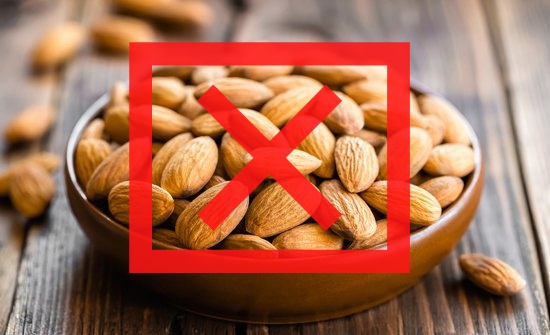Almonds are one of the perfect snacks for running because they contain healthy fats and protein and they were even found to ward off type 2 diabetes as their rich-protein content is an effective blood-sugar level stabilizer. Almonds are also high in fiber which helps you stay fuller, longer, so you are less likely to snack. Unfortunately, many have nut allergies, so here are 3 almond substitute nut allergy ideas that are just as good, if not better than eating nuts!

Almond Substitute Nut Allergy for Runners
If you can’t eat nuts, try these 3 delicious snack alternatives. They offer the same health and performance-boosting benefits for running.
Sunflower Seeds – Out-smart inflammation and muscle pain with sunflower seeds. They even have a nut-like crunch and are super rich in muscle-nourishing vitamin A. Sunflower seeds also outsmart age-related bone deterioration by enhancing osteoblast (cells needed for proper bone formation) function and may aid in the prevention of osteoarthritis and inflammatory bone disease (Choi, 2014).
Beans – Like nuts, beans are an excellent post-run recovery food. Red, black, lima and pinto beans keep you feeling less hungry throughout the day because they are very high in fiber (1 cup gives you 13 grams of fiber). Another bonus of fiber is that it prompts regular bowel movements. Even better, one study found that pinto beans lowered cholesterol and steadied blood/sugar levels, and most importantly, pinto beans were found to improve symptoms of heart disease (Finely et al. 2007). Furthermore, beans are a good source of protein and are also high in calcium, magnesium and potassium (Saas, 2008). Perhaps most notably, kidney, red and pinto beans contain more anti-oxidants than blueberries and cranberries (Saas, 2008).
Flax Seeds – Like nuts, flax seeds can help you live longer because they protect your heart. It turns out that flax seeds contain the same heart-healthy omega-3 fatty acids as nuts. And, just like sunflower seeds, flax seeds may heal hurt bones. One study concluded that flax seed intake may improve bone properties (Kim and Llich, 2011).
Hopefully these health suggestions will help you bounce back after a hard training session, and they are delicious and easy to whip up, so they can be enjoyed any time.
More From Run Forefoot:
Where to Find Running Shoes for Forefoot Running
References:
Choi, ME. Sunflower seed extract enhances the differentiation of osteoblastic MC3T3-E1 cells. Food & Agricult Immun, 2014 25(1):9-19.
Finely et al. Pinto Bean Consumption Changes SCFA Profiles in Fecal Fermentations, Bacterial Populations of the Lower Bowel, and Lipid Profiles in Blood of Humans. Amer Soc Nut, 2007; 137(11):2391-2398.
Kim Y and Llich, JZ. Implications of dietary α-linolenic acid in bone health. Nutrition, 2011; 27(11):1101-1107.
Saas, C. Natures perfect food. Prevention, 2008; 60(2):9.
Bretta Riches
BSc Neurobiology; MSc Biomechanics candidate, ultra minimalist runner & founder of RunForefoot. I was a heel striker, always injured. I was inspired by the great Tirunesh Dibaba to try forefoot running. Now, I'm injury free. This is why I launched Run Forefoot, to advocate the health & performance benefits of forefoot running and to raise awareness on the dangers of heel striking, because the world needs to know.
Latest posts by Bretta Riches (see all)
- Does Foot Strike Really Matter in Running? YES! - 17/04/2024
- Heel Lifts Increase Injury in Runners - 16/04/2024
- Are Minimalist Shoes Good for Seniors? YES! - 14/04/2024
